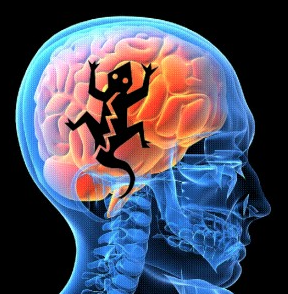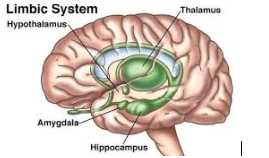
We all know that negative thoughts directly impact our happiness. But did you know that negative thoughts are actually literally poisonous to our psychological and emotional health?
Case in Point
Let’s imagine you are sitting in your family room after having watched the news on TV regarding the much anticipated hurricane Irma. You are by yourself and go to bed immediately after, with thoughts of worry and concern. Am I prepared? Did I buy what we needed? Is our home insulated well? Then all of a sudden, the rain starts outside and you hear drops of rain tapping on the window. Before you realize it, the sound magnifies and all you can hear are the water droplets on the window. You start by thinking “oh my gosh, what if that leaky faucet we’ve had in the kids bathroom doesn’t handle the pressure? “ “What if the pool overflows into the house? “What if Katie accidentally falls in the pool when she is out doing her business?” And on and on and on, your thoughts are racing. You have to wake up early the next day and you have now spent over an hour tossing and turning in bed, flooded with so many negative thoughts about a hurricane that has not even been determined to effect your area.
How Did You Get Here?
All of this was triggered by the sound of rain. Something simple, was transformed into something very hazardous by your thoughts. Automatic Negative Thoughts are just exactly that. Slow, but consistent at first, and then turn by turn, they have the potential to form in to a category 5 hurricane if we allow them. Its possible to stop them, but very difficult. Why? Because they have literally gotten your mind sick!
Here’s how thoughts grow into a phenomenon in our brain within the Limbic System. The two very serious illnesses of depression and anxiety are heavily caused by rumination, obsessions and the elaborate need for control of people and our environment. The need for control first begins with a single thought “what is going to happen?” Then it begins to take hold of our psyche and quickly turns in to fear, if it is not reasoned with. Why fear? Because the answer to “what is going to happen?” will always be “I don’t know”. If voluntarily stopped right away with a statement such as “I guess we will have to see” or “god knows” or “no one knows” or my personal favorite “let the chips fall where they may” we will ride through a few seconds of concern and then the gateway to fear will close. Otherwise, if the gate is opened and we answer “gosh, what if ….”, or “this is not good” , or “why did he say that and not …’, or “is it because I said,,,,”, we have now entered the land of chaos, despair, hopelessness, and self-doubt. There is a Liberian proverb that says: “ Do not look where you fell, but where you slipped.”
What Are you Thinking?
Every time you have an angry, scary, sad or happy thought, your body releases chemicals that activate your brain’s limbic system. Dr. Mark George, M.D., from the National Institutes of Mental Health, demonstrated this in a significant study. He studied brain activity in 10 healthy women under three different laboratory conditions. Through Magnetic Resonance Imaging (MRI), their brains were viewed as these women were illicitted to think happy, neutral and sad thoughts. During the happy thoughts, the women’s brains demonstrated a cooling of the deep limbic system. During the sad thoughts, there was a significant increase in deep limbic system activity. This is evidence that our thoughts tell our bodies what to do and hence we can tell our thoughts what to think. Polygraph and Lie detector tests, or what we actually believe to be most accurate here at the Center for Work Life, through Credibility assessment and Facial Action Coding, are based on this Limbic System response algorithm.
The Make Up of the Limbic System
The various parts of the the Limbic System, the Hypothalamus, the Amygdala, the Hippocampus, and the Cingulate Cortex all have different functions and hence different hormones associated. The hormones are impacted by our thoughts and set the tone for our emotional wellbeing. The more unhappy, fearful, anxious thoughts we have the more sick our brain will get and the more those thoughts will form within us. The same way, our immune system weakens with lack of sleep, alcohol, poor diet etc. Happy, positive experiences and thoughts are like boosters and vitamins for the Limbic System.
To Be or Not to Be Following our Thoughts
Just the same way as our thoughts can work for us during a speaking presentation, when we are excited and a surge of adrenaline allows our brain to give the best performance, or when we meet someone, and know we are attracted to them because, butterflies form in our stomach and think we want to have a meaningful relationship with them, it can work against us. Many people believe just because it is a thought, it must be true. Well, that is not correct! Unless you consciously think about your thoughts, they can form pretty automatically. We can think of them as pimples. Yes, your skin can automatically form pimples, but with a good skincare regimen coupled with the proper water intake, and diet and exercise, your skin is constantly resurfaced and cleansed, training everyday to not have pimples.
Socio-cultural Influences
Our culture is one of future planning. College savings, Life Insurance Policies, 401K plans, Saving’s Bonds, Mutual Funds, and even Home Mortgages etc. are all designed tools for the future. Forget about the concept of Capitalism and who profits here, and let’s stay with the “what” part of it. As human beings, were we meant to be future oriented? Or did we become conditioned somewhere along the way to become that way? Well, looking at Research in to other mammalian species, the dog for example, could help us realize that, we could be perfectly content living in the moment. Now, we are not advocating going out and maxing out credit cards, and forgetting about saving for our future, but we are saying, we can plan for tomorrow but live for today. In other words, when we think about happenings around us, we can use our Emotional Intelligence and divide them in to three categories easily: 1. the plannable, 2. The unplannable, 3. Somewhere in between.
Whether we are working a full-time job out there, or working full-time at home, as a home maker or parent, our work week is in The Somewhere in Between category. We can plan what activities we want to be engaged in, whom those activities will be involving, and even times those activities can be scheduled for. However, the outcomes of those activities, the length in real time it will take to complete the actitivities, the propellers vs. the hinderers will not be plannable. If you try to plan or analyze, or predict outcomes, you will spin yourself in to anxiety. The trick: You have to stop any future oriented, uncontrollable outcome related thoughts right away before they get hold of your brain. In other words, if they have already gotten to the 3rd scenario or “what if,” in this case, they are way too powerful to stop.
8 Everyday Exercises for a Healthy and Happy Brain at Work or in Life
- I am not in control; a power greater than me is.
- I surrender and accept whatever comes my way
- Uncertainty is a part of being alive
- When I am faced with an activity that worries me, I will imagine my favorite beach and I will get in, prepared but free to experience every wave.
- I will cross bridges as I arrive at them, and enjoy the process no matter what
- As soon as a negative thought enters my head, I treat it like a hurricane warning, I prepare, stay alert but calm, and use my support system.
- Keep record of my past trials and accomplishments and send empowering messages to my psyche
- I push myself to stay present in every task circumstance and tribulation.
A very powerful quote by one of the most celebrated Persian Sufi Poets of the 14th Century Mahmud Shabistari said: “The past has flown away. The coming month and year do not exist. Ours only is the present’s tiny Point.”








